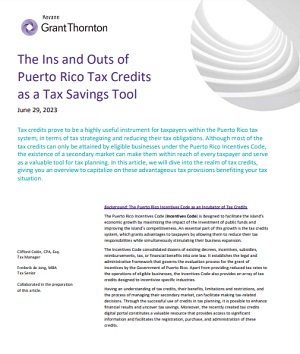-
Financial statements audits
Financial statement audits
-
Compliance audits
Compliance audits
-
Compilations and reviews
Compilations and audit
-
Agreed-upon procedures
Agreed-upon procedures
-
Tax compliance
Business Tax
-
Global mobility services
Through our global organisation of member firms, we support both companies and individuals, providing insightful solutions to minimise the tax burden for both parties.
-
Sales and use tax and indirect taxes
SUT/ VAT & indirect taxes
-
Tax incentives
Navigating the complex landscape of tax incentives in Puerto Rico can be challenging. Whether you're looking to benefit from the Export Services Act (Act 20), the Individual Investors Act (Act 22), or other incentives under Act 60, we provide tailored advice to help you maximize your tax benefits and ensure compliance. Let us help you unlock the potential of doing business in Puerto Rico.
-
Transfer Pricing Study
The laws surrounding transfer pricing are becoming ever more complex, as tax affairs of multinational companies are facing scrutiny from media, regulators and the public

-
Business consulting
Our business consulting services can help you improve your operational performance and productivity, adding value throughout your growth life cycle.
-
Business Risk Advisory
Risk is inevitable but manageable. We deliver relevant, timely and practical advices to aid organizations manage risk and improve business performance. We can help you identify, understand and manage potential risks to safeguard your business and comply with regulatory requirements.
-
Technology Advisory
We provide comprehensive solutions to safeguard your business and ensure operational resilience and compliance. Our expert team offers a range of technology advisory services designed to address your cybersecurity needs, enhance business continuity, and manage security effectively.
-
Transactional advisory services
Transactions are significant events in the life of a business – a successful deal that can have a lasting impact on the future shape of the organizations involved. Because the stakes are high for both buyers and sellers, experience, determination and pragmatism are required to bring deals safely through to conclusion.
-
Forensic and investigative services
At Grant Thornton, we have a wealth of knowledge in forensic services and can support you with issues such as dispute resolution, fraud and insurance claims.

Tax credits prove to be a highly useful instrument for taxpayers within the Puerto Rico tax system, in terms of tax strategizing and reducing their tax obligations. Although most of the tax credits can only be attained by eligible businesses under the Puerto Rico Incentives Code, the existence of a secondary market can make them within reach of every taxpayer and serve as a valuable tool for tax planning. In this article, we will dive into the realm of tax credits, giving you an overview to capitalize on these advantageous tax provisions benefiting your tax situation.
Background: The Puerto Rico Incentives Code as an Incubator of Tax Credits
The Puerto Rico Incentives Code (Incentives Code) is designed to facilitate the island's economic growth by maximizing the impact of the investment of public funds and improving the island’s competitiveness. An essential part of this growth is the tax credits system, which grants advantages to taxpayers by allowing them to reduce their tax responsibilities while simultaneously stimulating their business expansion.
The Incentives Code consolidated dozens of existing decrees, incentives, subsidies, reimbursements, tax, or financial benefits into one law. It establishes the legal and administrative framework that governs the evaluation process for the grant of incentives by the Government of Puerto Rico. Apart from providing reduced tax rates to the operations of eligible businesses, the Incentives Code also provides an array of tax credits designed to incentivize specific industries.
Having an understanding of tax credits, their benefits, limitations and restrictions, and the process of managing their secondary market, can facilitate making tax-related decisions. Through the successful use of credits in tax planning, it is possible to enhance financial results and uncover tax savings. Moreover, the recently created tax credits digital portal constitutes a valuable resource that provides access to significant information and facilitates the registration, purchase, and administration of these credits.
What is a Tax Credit?
Generally, a tax credit is a type of subsidy that is extended to taxpayers with a Decree of Tax Exemption (Decree) under the provisions of the Incentives Code (Exempt Business), aimed at promoting business expansion through incentives. These tax credits are granted in exchange for investment, employment creation, innovation, and development of certain industries of interest to the economic development of Puerto Rico (such as tourism, manufacturing, among others). Tax credits are bound by specific restrictions and provisions outlined in the Incentives Code and the Puerto Rico Internal Revenue Code (Tax Code).
An Exempt Business includes a wide range of classifications, such as: exporting services, tourist economic activities, manufacturing, and other specifically designated enterprises. The aforementioned encompass a variety of activities, including essential services, industrial development, recycling, scientific advancement, and technological progress. A tax credit is a beneficial instrument that can assist in the decrease of a taxpayer’s tax liability. This mechanism operates by providing a one-to-one reduction in tax liability; it is more effective than a tax deduction since it counters the exact amount owed.
Tax Credit Limitations
The application of the tax credit is determined by its specific classification. Tax credits that are eligible for reimbursement can prove to be highly valuable. For example, if the sum of the credits surpasses the taxpayer’s tax liability, the excess may be reimbursed to the taxpayer. Consequently, it implies that the taxpayer is not only required to pay a reduced amount of tax, but they may also potentially obtain a refund for any remaining excess.
In contrast, tax credits that are nonrefundable do not qualify for reimbursement. Nevertheless, they continue to be a favorable asset. In the event of an overabundance of nonrefundable credits that surpasses the current tax responsibility, said surplus may be transferred to subsequent years. This carry over enables taxpayers to leverage these credits in subsequent years when their tax liability may be higher.
An additional factor to consider about tax credits is that they may be subject to moratoriums. Under a moratorium the amount of the tax credit that may be used for a certain year may be limited. Such moratoriums are designated in the Tax Code, which currently includes tax credits from legislation prior to the enactment of the Incentives Code. Nevertheless, this section should be monitored as Tax Code amendments are fairly common.
Use of Credits in Tax Planning
Taxpayers may effectively employ tax credits as a means to satisfy or supplement their responsibility to pay income taxes. By doing so, taxpayers can fulfill their tax responsibilities, thereby circumventing any further taxes or penalties. During the planning process, taxpayers may deliberate on the utilization of any tax credits carried over from previous years or anticipated credits that are likely to be generated during the current year, to appraise their tax liability and ascertain the necessary estimated income tax payments.
In addition, taxpayers can avail themselves of the chance to procure tax credits in secondary markets, often at a reduced price. This reduced price serves as a discount on their tax liability. As a result, taxpayers can reduce their aggregate tax obligations and retain higher earnings by making strategic acquisitions of tax credits. Furthermore, any benefit from the discount is tax-free.
The use of tax credits can not only mitigate a taxpayer’s tax burden, but also enhance cash flow management. When taxpayers buy tax credits, they are effectively making advance payments towards their forthcoming tax liabilities, resulting in a favorable effect on their liquidity. This methodology facilitates taxpayers in optimizing the allocation of their financial resources and strategizing for future tax disbursements. Improved liquidity enables taxpayers to handle their day-to-day expenditures efficiently, strategically invest in business expansion, and more adeptly maneuver financial obstacles.
Genesis of Incentives Code Tax Credits
Tax credits are generally offered to specific programs and projects to maximize their economic impact, the return on investment, and the yield thereof. The credits are granted by means of an incentives agreement entered into between the Puerto Rico Department of Economic Development (DEDC) and the Exempt Business. Such businesses will not pay taxes for the credit received and the buyer will not pay taxes on the credit purchased or any gain therein obtained as part of the transaction. These credits offer an opportunity for taxpayers to engage in government-incentivized initiatives and foster economic advancement on the island.
Puerto Rico tax laws offer a wide range of tax credits for Exempt Businesses. Such credits are conferred by specific sections of the Tax Code, Prior Tax Incentives Laws (e.g., Act 73-2008, Act 74-2010, Act 83-2010), and the Incentives Code. The table below summarizes some of the available tax credits under the Incentives Code.
|
Basis of Tax Credit |
General Description |
General Limitations |
|
Eligible tourism investments (“ETI”) |
Available for the tourism industry, there are two alternatives: · 30% of ETI (maximum amount equals 30% of total cost of the project); or · 40% of ETI (maximum amount equals 40% of total cost of the project). The Exempt Business may only choose one of these two options. Each option has its credit issuance installment timeline. For example, although the 30% has a lower threshold than the 40% option, there is an upfront installment of 10% on the year the Exempt Business secured financing to complete the project, and subsequent installments are issued starting on the first year the Exempt Business has its first paying guest. Under the 40% option, the credit may only be used after the second year of operations. |
· Granted to the exempt business, who generally holds title to the credit. In the case of a condo hotel, the developer may choose to apply for a tax credit for itself or reserve the tax credit to be claimed by the acquirer of a condo hotel unit. For priority projects in opportunity zones, the credit belongs to the investor and not the exempt business. · May be used to offset 100% of tax liability for the tax year in which they are used; · The credit not used in a specific year may be carried over to subsequent taxable years, until exhausted, pursuant to the provisions of 1051.16(h) of the Tax Code, if applicable. · With the exception of the credit for Purchase of Products Manufactured in Puerto Rico, it may be ceded, sold, or transferred. The credit for Purchase of Manufactured Products may only be transferred in an exempt reorganization. · Nonrefundable, except when assigned to the Department of Treasury (discussed later). |
|
Purchase of Products Manufactured in Puerto Rico |
Available for all Exempt Businesses under the Incentives Code, this option allows as a credit up to 25% (30% if business is in Vieques or Culebra) of cost of purchasing Products Manufactured in Puerto Rico from an Exempt Business with a manufacturing Decree, including parts and accessories, or purchases or uses products converted into commercial articles made of recycled materials, or raw material made from recycled, recovered, or refit materials. |
|
|
Special Eligible investment in R&D |
Available for all Exempt Businesses, this credit grants up to 50% of the qualified investments in R&D projects carried out in Puerto Rico. The credit will be available for use in two or more installments. |
|
|
Creative industries |
Available for the film industry, this credit allows amounts certified as disbursed in connection with Puerto Rico production expenditures, with an annual limit of $100M: · Up to 40%, without including payments made to foreign persons; and · Up to 20%, consisting of payments made to foreign persons; and · Up to 15%, without including payments made to foreign persons, in feature films, television series or documentaries, up to $4M. The credit will be available for use in two or more installments. |
|
|
Eligible investment in Priority Projects in opportunity zones |
Every investor of an Opportunity Zone Fund is entitled to a credit equal to the eligible percentage of the investor’s eligible investment (5% credit guaranteed). The Committee for Opportunity Zones grants an incremental 5% credit for each criterion met by the Exempt Business, up to a maximum of 25%. The total amount of credit will depend upon compliance with criteria established by the Committee. The credit will be available for use in four installments. |
Secondary Market for Tax Credits
After generating a tax credit, the Exempt Business may choose between various alternatives. For example, the Exempt Business may use the credit to reduce its income tax responsibility. The Exempt Business may also find itself in a position in which it has a surplus of credit since its net taxable income subject to special rates is lower than the credit available or may be in need of cash flows to repay initial development costs that some of the incentives require. As a result, the Exempt Business may sell the credit to prospective buyers in secondary markets or assign it to the Puerto Rico Department of Treasury (PR Treasury). One attractive factor is that any tax credit granted to an Exempt Business in Puerto Rico is tax-free, while the buyer being able to use 100% of the credit purchased, and the seller will not need to recognize taxable income from the earnings of selling the credit.
Typically, the sale of tax credits in secondary markets entails a series of steps. Initially, it is imperative for the seller to evaluate the value of the tax credits, factoring in aspects such as: the nature of the credit, demand in the market, and the standard rates prevailing. Procuring potential buyers for the credits can be accomplished via a variety of opportunities, such as engaging with brokers, financial institutions, and cultivating relationships within the commercial circle. Subsequently, the negotiation phase ensues in which the seller and prospective buyer mutually settle upon the acquisition cost, payment modalities, and other stipulations.
Following the settlement of the terms, it is required to execute the transfer of the tax credits by means of appropriate documentation and in accordance with established legal protocols. To perform the transfer of ownership and entitlements of the tax credits to the buyer, a formal assignment agreement or transfer certificate is duly executed. Upon obtaining the tax credits, the buyer may employ them towards the mitigation of their own Puerto Rico income tax obligations, thus granting them a notable economic benefit. Adherence to the pertinent laws and regulations regarding the acquisition and disposition of tax credits in Puerto Rico is of utmost importance for each and every concerned taxpayer.
As an unusual but available alternative, the Exempt Business may opt to assign the tax credit to the PR Treasury. For tax credits granted after June 30, 2021, the credit can be assigned in exchange for a refund equal to 90% of the tax credit face value. For tax credits granted before July 1, 2021, the refund is equal to 85% of the tax credit face value. Nevertheless, the PR Treasury, considering the nature of the tax credit and the economic conditions of the tax credit market, may establish a different refund percentage, subject to certain limitations.
Tax Credit Management System
Act No. 52 of 2022 introduced significant amendments to the Tax Code, including the establishment of a Tax Credit Management System (TCMS). The TCMS is a centralized platform that enables taxpayers to proficiently manage and use their tax credits. It also sets a sunset to tax credits issued prior to 2023.
Taxpayers can ensure regulatory compliance and avail themselves of the advantages linked with their tax credits by registering said credits in this system. The TCMS also enables the conveyance or dissemination of tax credits to alternative qualified beneficiaries. Within the system, taxpayers are able to transfer or assign their credits. It is imperative that buyers or assignees of the credits adhere to the constraints put forth by the TCMS.
1. Post TCMS Credits. – Tax credits granted on or after January 1, 2023, are required to be recorded in the TCMS. Credits that are not recorded in the TCMS may not be used to offset the income tax liability. To maximize the utilization of the tax credits, taxpayers are required to adhere to the rules established by the PR Treasury. This entails providing all necessary documentation to demonstrate the reception, authorization, and retention of the tax credits.
2. Pre TCMS Credits. – Tax credits granted prior to January 1, 2023, are not required to be recorded in the TCMS. Nonetheless, taxpayers can claim these credits against their tax liabilities for a period of 3 tax years after January 1, 2023; that is, taxpayers are able to use these credits for tax years 2023 through 2025. It is important to note that any unused balance of these credits at the end of the 3-year period cannot be carried over to subsequent tax years.
Bottom Line
The use of Puerto Rico tax credits can provide considerable advantages for both businesses and individuals by mitigating tax liabilities and fostering the expansion of the local economy. Through a comprehension of the different categories of tax credits at one's disposal and their associated constraints, taxpayers can devise a strategic approach towards their tax planning, thereby maximizing their economic returns and accessing tax savings.
Employing tax credits as a strategy in tax planning facilitates the successful decrease of tax obligations and better management of cash flows. Taxpayers may also venture into the secondary market for tax credits to procure them at reduced rates, thus maximizing their tax benefit.
Note that not all tax credits are created equally. If you are interested in procuring or using tax credits, contact us to assist you in determining which is the best fit for you.
We are committed to keeping you up to date with all tax-related developments. Please contact our Tax Department, should additional information be required regarding this or any other tax issue. We will gladly assist you!
DISCLAIMER: This update and its content do not constitute advice. Clients should not act solely on the basis of the material contained in this publication. It is intended for information purposes only and should not be regarded as specific advice. In addition, advice from proper consultant should be obtained prior to taking action on any issue dealt with this update. Information provided in this publication may change in the future and such change may be applied retroactively. Kevane Grant Thornton LLP does not assume the responsibility to update this communication if the applicable laws change.
© 2023 Kevane Grant Thornton LLP All rights reserved. Kevane Grant Thornton LLP is a member firm of Grant Thornton International Ltd (GTIL). GTIL and the member firms are not a worldwide partnership. Services are delivered by the member firms. GTIL and its member firms are not agents of, and do not obligate, one another and are not liable for one another’s acts or omissions. Please visit www.grantthornton.pr for further details



